Choosing the right kitchen countertop can significantly impact the functionality and aesthetics of your kitchen. With a myriad of options available, each offering unique benefits and drawbacks, it’s essential to consider your lifestyle, budget, and design preferences when making a decision. Granite countertops remain a popular choice due to their durability and natural beauty. They come in a variety of colors and patterns, making it easy to find a style that complements your kitchen décor. Granite is also heat-resistant and can withstand the daily wear and tear of a busy kitchen. However, it requires periodic sealing to prevent staining and maintain its luster.
Quartz countertops have gained popularity in recent years for their non-porous nature and low maintenance requirements. Composed of engineered stone, quartz countertops are available in a wide range of colors and designs, including those that mimic the look of natural stone. They are resistant to stains, scratches, and heat, making them an excellent choice for high-traffic kitchens. Unlike granite, quartz does not require sealing, but it can be susceptible to damage from prolonged exposure to direct sunlight.
Marble countertops are the epitome of luxury and elegance. Known for their stunning veining and timeless appeal, marble countertops can elevate the look of any kitchen. However, marble is a softer stone and is more prone to scratches and stains compared to granite and quartz. It requires regular sealing and careful maintenance to preserve its beauty. Marble is best suited for kitchens where aesthetics are prioritized over heavy use.
Butcher block countertops offer a warm, rustic charm that is unmatched by stone surfaces. Made from strips of hardwood, such as maple or oak, these countertops are ideal for those who enjoy a natural and inviting kitchen environment. Butcher block surfaces are perfect for food preparation, as they are gentle on knives and can be sanded and refinished to remove scratches and stains. However, they require regular oiling to prevent drying and cracking and are not as heat-resistant as stone countertops.

Concrete countertops are a versatile option that can be customized to fit any kitchen design. They can be stained, textured, and even embedded with decorative elements like glass or stones. Concrete countertops are incredibly durable and can withstand high heat and heavy use. However, they are prone to cracking and must be sealed to prevent stains and water damage. The weight of concrete countertops also requires sturdy cabinetry for support.
Laminate countertops are a budget-friendly option that offers a wide variety of colors and patterns, including designs that mimic the look of natural stone or wood. They are easy to clean and maintain but are less durable than other materials and can be damaged by heat and sharp objects. Laminate countertops are an excellent choice for those looking for an affordable and stylish option without the need for heavy maintenance.
Stainless steel countertops provide a sleek, modern look that is perfect for contemporary kitchens. They are highly durable, resistant to heat and stains, and easy to clean, making them a favorite among professional chefs. However, stainless steel can show fingerprints and scratches more easily than other materials. Despite these drawbacks, the industrial appeal and hygienic properties of stainless steel make it a popular choice for those seeking a minimalist and functional kitchen design.
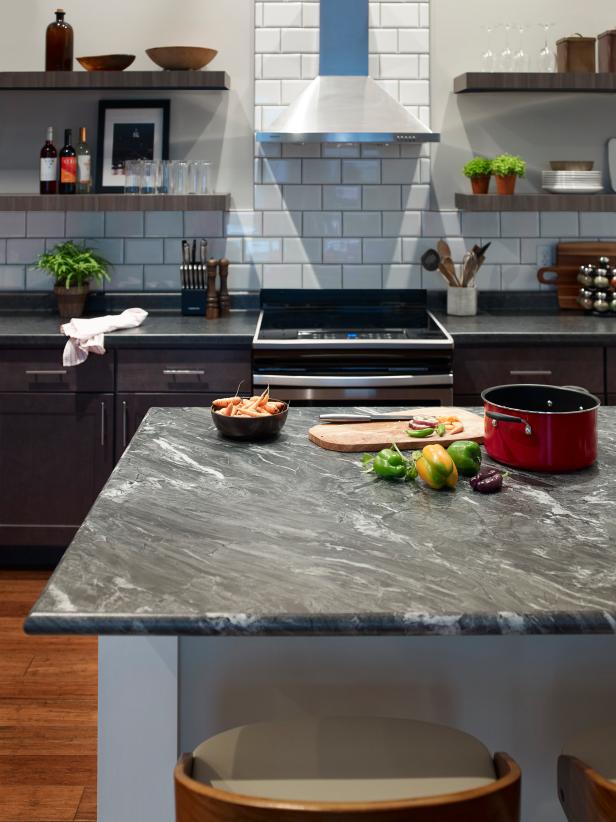
Solid surface countertops, such as Corian, offer a seamless and non-porous surface that is easy to clean and maintain. Available in a variety of colors and patterns, solid surface countertops can be custom fabricated to include integrated sinks and backsplashes. They are resistant to stains and bacteria but can be scratched or damaged by high heat. Minor scratches can be buffed out, but deeper damage may require professional repair.
Recycled glass countertops are an eco-friendly option that combines sustainability with unique aesthetics. These countertops are made from crushed glass embedded in a resin or cement base, creating a vibrant and distinctive surface. They are resistant to stains and heat but can be prone to chipping and require regular sealing to maintain their appearance. Recycled glass countertops are ideal for environmentally conscious homeowners who want to make a bold statement in their kitchen.
Tile countertops offer a wide range of design possibilities, from traditional to contemporary styles. Ceramic and porcelain tiles are durable, heat-resistant, and easy to clean, making them a practical choice for kitchen countertops. The grout lines between tiles can be a challenge to keep clean and may require periodic sealing to prevent stains. Tile countertops allow for creative expression and can be customized with various colors, patterns, and textures.
Soapstone countertops are known for their smooth, matte finish and rich, deep colors. This natural stone is resistant to stains, heat, and acids, making it a durable choice for kitchen countertops. Over time, soapstone develops a patina that adds to its charm and character. While it is softer than granite and can scratch more easily, these scratches can be sanded out or left to blend into the natural patina.
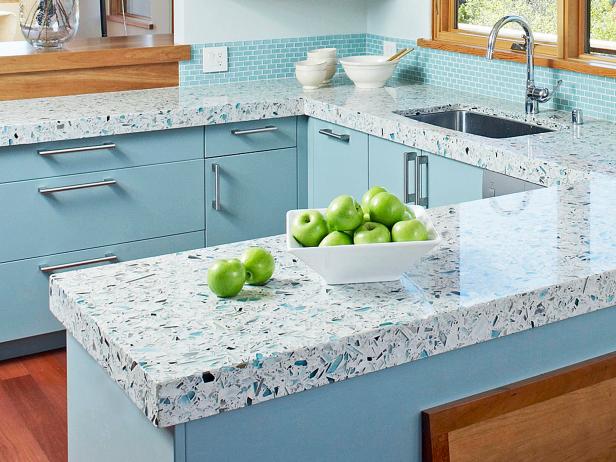
Glass countertops offer a sleek, modern look and are available in various colors and finishes. They are non-porous, easy to clean, and resistant to heat and stains. However, glass can be prone to chipping and scratching and may not be suitable for heavy use. Tempered glass countertops are more durable and can add a striking, contemporary element to any kitchen design.
Copper countertops provide a unique, warm aesthetic that evolves over time. The natural patina that develops on copper surfaces can create a distinctive, antique look. Copper is naturally antimicrobial, making it a hygienic choice for kitchen countertops. However, it is a softer metal that can dent and scratch easily. Regular maintenance, including polishing and sealing, is required to preserve its appearance.
Zinc countertops are another metal option that offers a distinctive, industrial look. Over time, zinc develops a natural patina that can range from blue-gray to dark gray. This patina adds character and depth to the surface. Zinc is non-porous and resistant to bacteria, making it a practical choice for kitchen countertops. Like copper, zinc is softer and can dent and scratch more easily than other materials.
Finally, terrazzo countertops are a composite material made from chips of marble, quartz, granite, glass, or other materials set in a cement or resin binder. This versatile and durable material is available in a wide range of colors and patterns. Terrazzo is resistant to stains, heat, and scratches, making it an excellent choice for busy kitchens. It requires periodic sealing to maintain its appearance and prevent damage.

Common Mistakes to Avoid
When choosing a kitchen countertop, one common mistake is prioritizing aesthetics over functionality. While it’s important to love the look of your countertop, it’s equally crucial to consider how it will perform in your kitchen. For instance, marble is beautiful but may not be the best choice for a heavily used kitchen due to its susceptibility to scratches and stains.
Another mistake is not considering the maintenance requirements of different materials. Some countertops, like granite and butcher block, require regular sealing or oiling, which can be time-consuming and costly. Additionally, overlooking the weight of certain countertop materials, such as concrete, can lead to structural issues if your cabinetry is not strong enough to support them.
Lastly, failing to plan for the long-term costs associated with repair and replacement can result in unexpected expenses down the line.
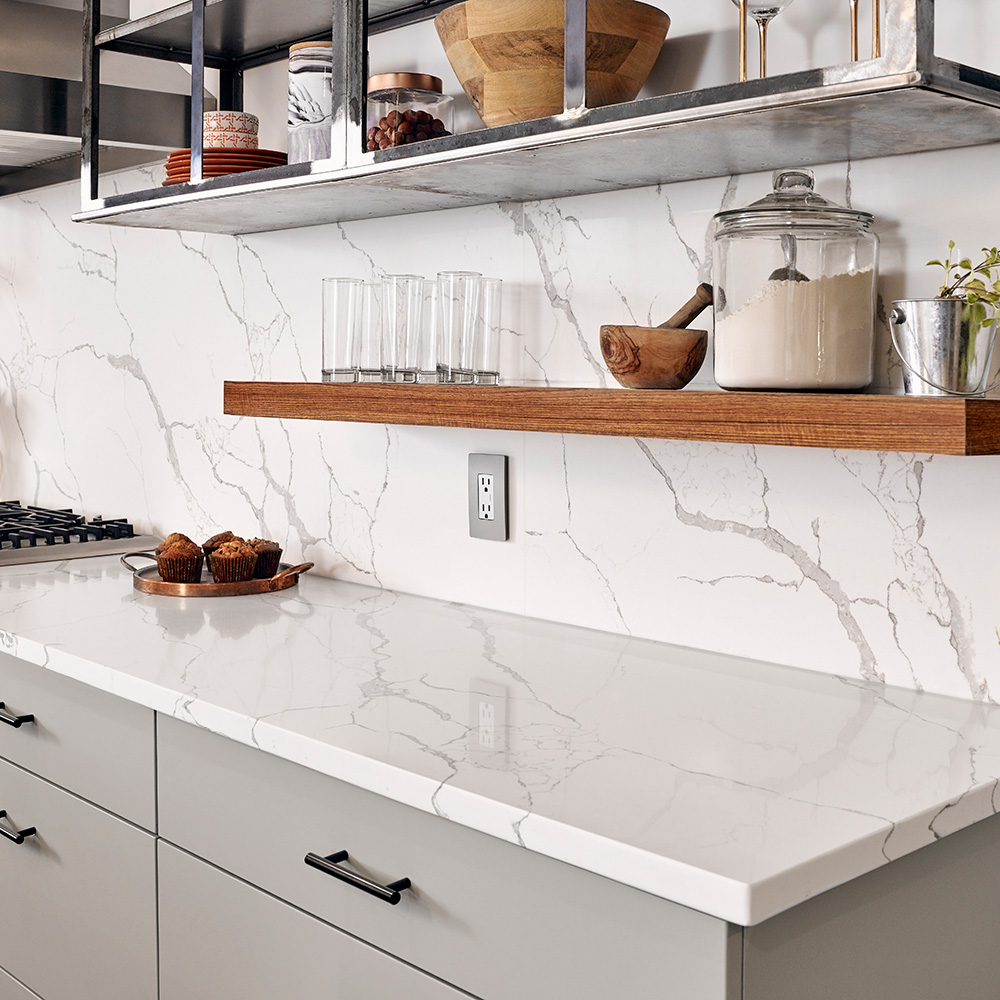
What is the most durable kitchen countertop material?
Granite and quartz are among the most durable kitchen countertop materials. Granite is a natural stone that is heat-resistant and can withstand daily wear and tear, though it requires periodic sealing to prevent staining. Quartz, an engineered stone, is non-porous, highly resistant to stains, scratches, and heat, and does not require sealing. Both materials are excellent choices for kitchens that see heavy use.
How do I maintain my butcher block countertop?
Maintaining a butcher block countertop involves regular oiling to prevent the wood from drying out and cracking. Food-grade mineral oil or beeswax are commonly used for this purpose. It’s also important to promptly clean up spills to avoid stains and to periodically sand and refinish the surface to remove scratches and maintain its appearance. Avoid placing hot pots directly on the wood, as it can scorch.
Can I use marble countertops in a busy kitchen?
While marble countertops are stunning and add a luxurious touch to any kitchen, they are not the most practical choice for a busy kitchen. Marble is a softer stone and is more prone to scratches, stains, and etching from acidic substances. If you choose marble for a high-traffic kitchen, be prepared for regular maintenance, including sealing and careful handling to preserve its beauty.
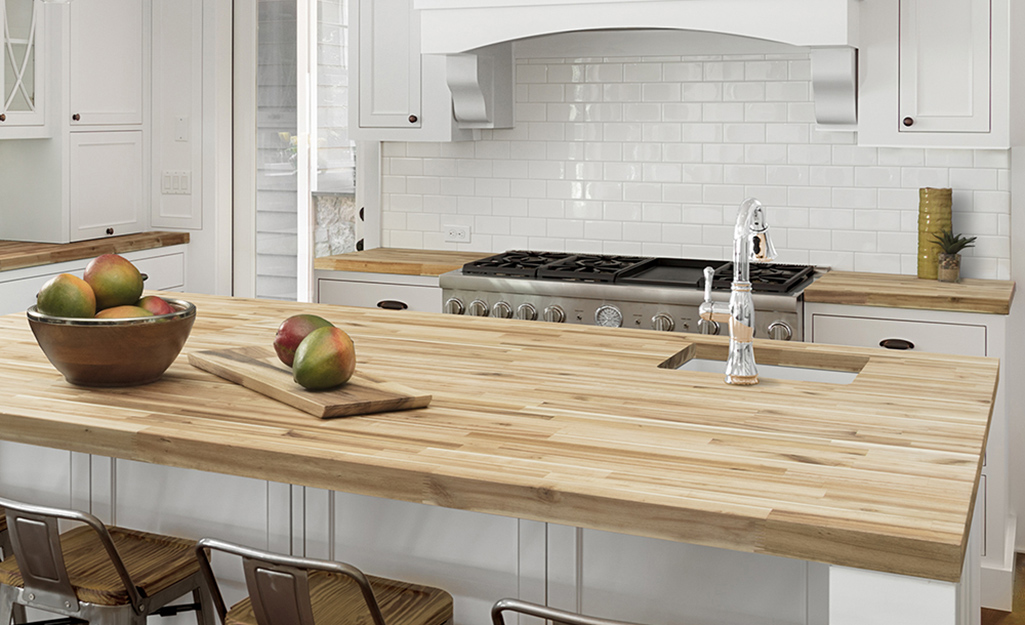
Are laminate countertops a good option for budget-conscious homeowners?
Yes, laminate countertops are an excellent option for budget-conscious homeowners. They offer a wide variety of colors and patterns, including designs that mimic the look of more expensive materials like granite or wood. Laminate countertops are easy to clean and maintain, though they are less durable than other materials and can be damaged by heat and sharp objects. They provide a stylish and affordable solution for those looking to update their kitchen without breaking the bank.
What are the benefits of stainless steel countertops?
Stainless steel countertops are highly durable, heat-resistant, and easy to clean, making them a favorite among professional chefs and home cooks alike. They offer a sleek, modern look that fits well in contemporary kitchen designs. Stainless steel is also non-porous and resistant to bacteria, making it a hygienic choice for food preparation areas. However, it can show fingerprints and scratches more easily than other materials, so regular cleaning and maintenance are necessary to keep it looking its best.
How do I choose the right countertop material for my kitchen?
Choosing the right countertop material for your kitchen involves considering several factors, including your budget, lifestyle, and design preferences. Think about how much use your countertops will get and what type of maintenance you are willing to perform. Consider the overall style of your kitchen and how the countertop material will complement it. Visiting showrooms, consulting with kitchen designers, and reviewing samples of different materials can help you make an informed decision that balances aesthetics, functionality, and cost.
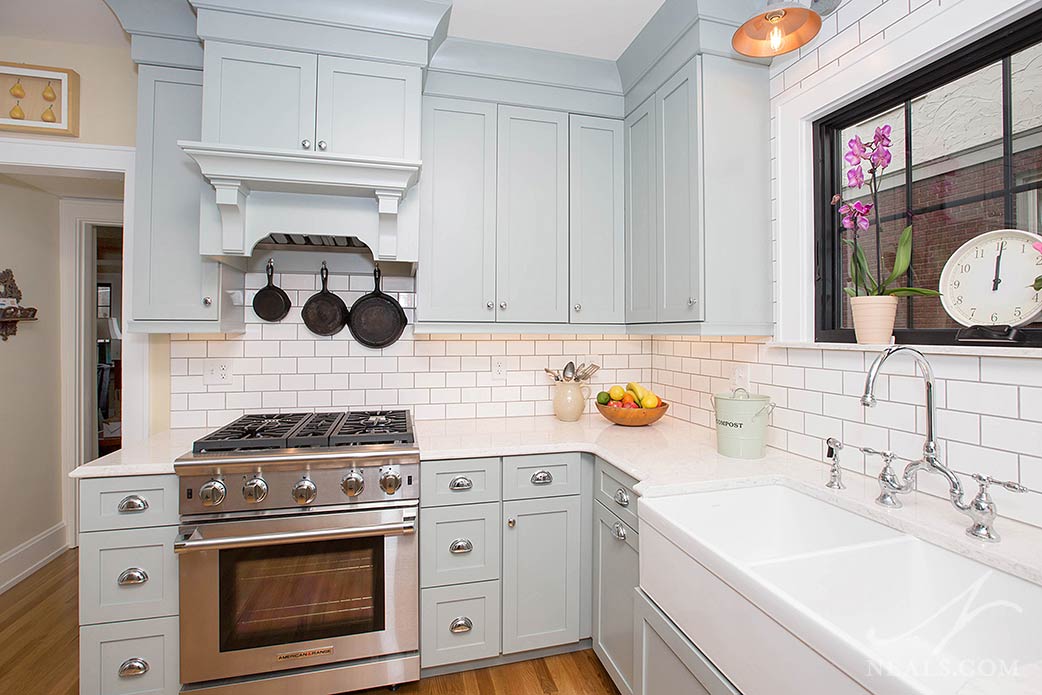
Kitchen Counters – Design Ideas for Kitchen Countertops
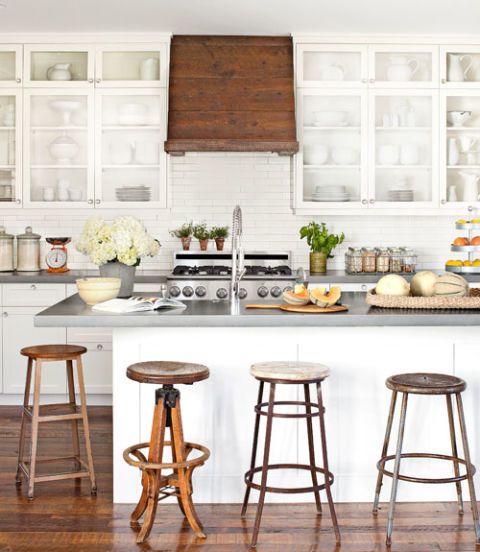
Kitchen Countertop Ideas
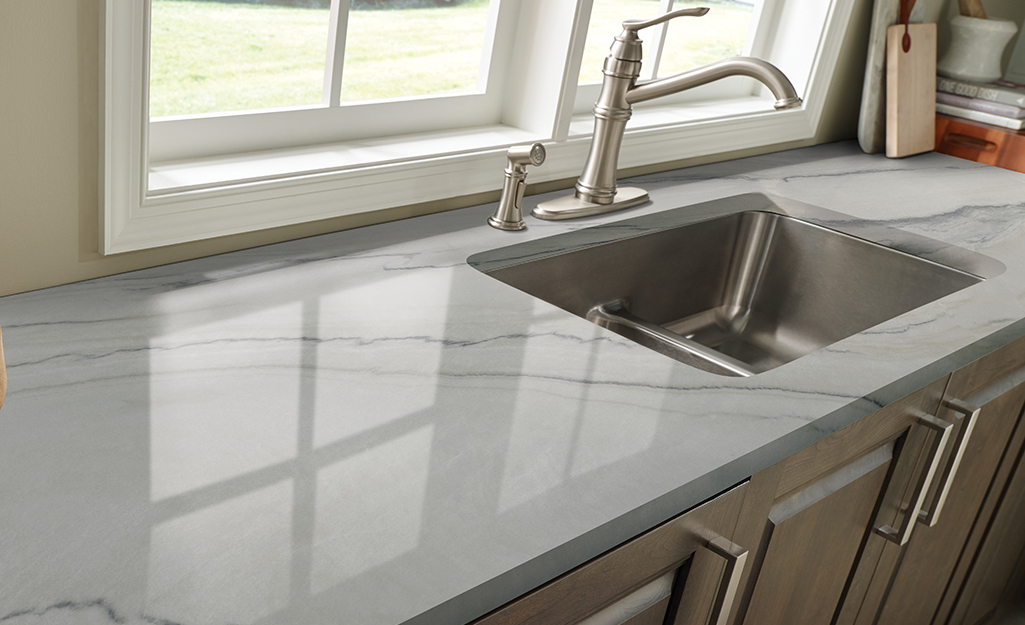
Related articles: